![]()
![]()
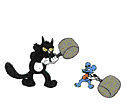
'Best of TBH Politoons'
Baron Dave Romm
Guest Columnnist David Bratman
By Baron Dave Romm
Shockwave Radio
Theater Podcasts
for iTunes and iPods, with
pictures
Shockwave Radio
broadcasts on archive.org
Bookmark my bookmark
page.
Nascent Wikipedia entry for Shockwave Radio Theater
A gift of the Classical Magi.
David Bratman has been a listener to classical music and commentator for many years. Here are some of his recommendations for Bartcop-E!
Classical music sometimes strikes fear in the heart of people who don't listen to it regularly. It's so complex and full of recapitulations and other oddly-named things, and its fans are such snobs, unwilling to give you the time of day if you don't know how many symphonies Shostakovich wrote or can't tell the difference between Toscanini and Furtwängler.
As a classical snob myself, I have some advice: ignore us. Don't let us condescend to you (Ringo's famous comeback, "I love Beethoven, especially his poems," is still good), and above all don't be paralyzed by our picayune discrimination between different recordings of the same work. Compared to the average difference between two different performers in the same pop song, the difference between two different performances of classical music - especially instrumental music - is minuscule. To the casual ear trained in popular music, they're likely to sound exactly alike.
So don't worry about it. If you've heard a piece and like it, buy that recording, or just get the cheapest or the one with a familiar name as performer. Listen to classical stations, in broadcast or on the web, or check out the enormous subscription-only sound files on the Naxos label website. There's lots of good books giving guidance through the repertoire and explaining exactly what's going on in a piece that lasts forty minutes with no words. Or listen to the excellent explanatory talks on the BBC website.
All the same, if you want the best possible performance of some of the greatest music ever written, one that knocked my socks off a fair distance was the Takacs Quartet in Beethoven's string quartets. There's sixteen of these works - plus a piece called the "Grosse Fuge" (Great Fugue) which was the original finale of number 13 (Opus 130) - and they start easy and get harder. Like most complete sets, Takacs's is in three volumes of two to three discs each. The early quartets are modeled after Mozart's, but they still sound like Beethoven: less genteel, more brusque. The middle quartets are big, forceful works from the same period as the Eroica and Fifth Symphony, the best-known part of Beethoven's career. The late quartets should be saved for last: they're introspective, tough, and gnarly, though they have their surprising soft spots: if you're a Joss Whedon fan, you'll recognize the "danza tedesca" (German dance) movement of that same Opus 130 as the party music from the "Shindig" episode of Firefly.
As for the performance, the Takacs Quartet are just amazing. They really listen to each other, their music breathes as if they were one entity, and as I wrote in reviewing their live performance, they play as if all Hell were on fire. It's only four fiddles (two violins, viola, and cello), but there's as much intensity and vividness here as from any band ever formed.
But people have been recording Beethoven for a century. Someone asked for my favorite all-new music of 2006, and I answered, "Philip Glass's Symphony No. 8." Some people will tell you that Philip Glass writes mindlessly noodling, endlessly repetitive music, but they haven't been paying much attention. He got that phase out of his system over thirty years ago, and added harmonic progressions and shifts in perspective to his discoveries in repetition. His music today has both large and small-scale movement: it goes somewhere, and does it interestingly. Glass is a good classical composer for rock fans. When he builds up a climax from a repetitive motif, it sounds a lot like a rock song with a catchy riff. He's written two other symphonies (the "Low," No. 1, and "Heroes," No. 4) based on David Bowie/Brian Eno albums, and in the 80s put out a song album, "Songs from Liquid Days," with lyrics by Paul Simon, Suzanne Vega, David Byrne, and Laurie Anderson, with vocals by Linda Ronstadt and the Roches. And now he's up to his Symphony No. 8 for orchestra - big (39 minutes), kaleidoscopic, and colorful, with dark strings and piping winds, fast and churning in its first half, quiet and stealthy afterwards. Besides, the number is cool. If you're not a big classical collector, how many Symphonies No. 8 do you have, anyway, besides maybe Schubert's Unfinished? Be honest, now.
All right, let's finish with something short, weird, and a bit obscure. Henry Cowell was one of the great eccentrics of 20th century American music. He invented playing the piano with his whole forearm (softly, producing a hesitant wash of sound), served time in prison on a morals charge, and championed folk music both at home and abroad. Cowell was the man who brought the first great American composer, Charles Ives, to public attention; and he inspired John Cage, the man who rewrote the definition of the word "music."
Of the CDs of Cowell's music, maybe the most interesting is Dancing with Henry, a collection of pieces from the 1920s and 30s mostly written to be danced to, played by a group called the California Parallèle Ensemble. The album has nine different works. There's bouncy dances, exotic Asian harmonies and Irish folk music, plain harmonies and crazy dissonances, and strangest of all, a piece called "Atlantis" including voices that don't sing: in the words of the liner notes, they moan, groan, wail, sigh, grunt, and squeal. It's like some strange modernistic pirate music, or the musical battle between King Kong and Godzilla. Aargh, me hearties!
Baron Dave Romm is a conceptual artist and a noble of Ladonia who produces Shockwave Radio Theater, writes in a Live Journal demi-blog, plays with a very weird CD collection and an ever growing list of political links. Dave Romm reviews things at random for obscure web sites. You can read all his music recommendations from Bartcop-E. Podcasts of Shockwave Radio Theater. Permanent archive. More radio programs, interviews and science fiction humor plays can be accessed on the Shockwave Radio audio page.
Thanks to everyone who has sent me music to play on the air.
--////
Recommended Reading
from Bruce
Pope uses Christmas speech to denounce gay couples (advocate.com)
Pope Benedict XVI touched on many of the themes close to his heart, including celibacy in the priesthood, dialogue between religions, and his opposition to legal rights for gay and unmarried couples in a year-end speech Friday in Vatican City.
Jennifer Chrisler, executive director of Family Pride: What now, Grandpa Cheney? (advocate.com)
So Vice President Dick Cheney is going to be a grandfather again, this time to the baby his daughter Mary is having with her partner. Too bad the Bush administration has made life harder for families headed by lesbians and gays. How will Grandpa sleep at night once the baby's born?
Kavitha Rao: 'Eve-Teasing' Makes India's Streets Mean for Women (womensenews.org)
Back in India after 10 years, Kavitha Rao faces the affronts and fears of "eve teasing," the innocuous-sounding term for street harassment. Those who fight back occasionally suffer violent reprisals, but some activists are braving the risks.
GREG HERNANDEZ: Flying the Bitchy Skies (frontierspublishing.com)
Tart-tongued air hostess Pam Ann is cleared for landing in a special New Year's show
Malinda Lo: Year in Queer 2006: Television (afterellen.com)
The television landscape in 2006 was an uneven one for lesbians and bisexual women. In some areas, such as unscripted programming, lesbians became so commonplace that there almost seemed to be one on every reality show. But on the broadcast network channels, recurring lesbian characters could be counted on one hand. Meanwhile on cable, lesbian characters did show up regularly, but were rarely if ever allowed to have romantic lives unless they were part of a primarily gay show such as The L Word.
Diane Anderson-Minshall: We're Nuts About Nadine (curvemag.com)
Ah, who can resist a woman with issues? Teen runaway, vagabond and troubled artiste, bad girl Van stole our hearts the moment she walked onto Dante's Cove, the super sexy, super gay, supernatural thriller from here! TV. Between gorgeous exotic features, a penchant for witchcraft and the fact that she beds exclusively other chicks, Van's quickly becoming one of our favorite gals on the small screen. We recently chatted with Nadine Heimann, the ravishing rookie actor who breathes life into her.
Rabbi Dr. Asher Meir: The Jewish Ethicist (jewishworldreview.com)
Q: Do employers have a responsibility to provide workers with decent working conditions?
Michael Jensen: Interview With Brokeback Mountain Producer James Schamus (afterelton.com)
To celebrate the anniversary of Brokeback Mountain's release, we recently spoke with Brokeback's executive producer and the CEO of Focus Features, James Schamus.
Interview by Laura Sheahen: Susan Sarandon (beliefnet.com)
The star says imagination and empathy are what make her an actor--and an activist.
Rabbi S. Binyomin Ginsberg: So, what gifts did you get? (jewishworldreview.com)
Teaching our children the difference between fair and equal.
The Christmas Coat (beliefnet.com)
I remember my first Christmas adventure with Grandma. I was just a kid. I remember tearing across town on my bike to visit her on the day my big sister dropped the bomb: "There is no Santa Claus," she jeered. "Even dummies know that!"
Commentoon: Boy or Girl? (womensenews.org)
Hubert's Poetry Corner
I'LL BE CLONED FOR CHRISTMAS - AND THEN SUM
THE DARK SIDE OF TOO MANY FOR CHRISTMAS?
Purple Gene Reviews
Children of Men



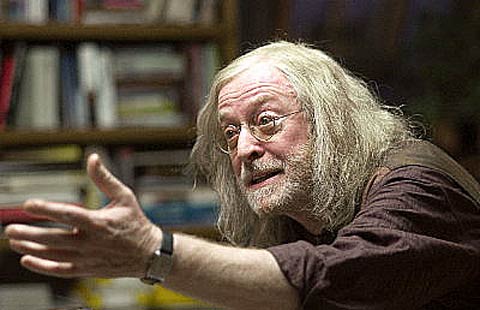
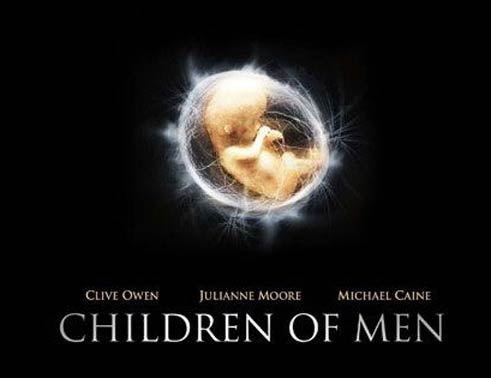

Selected Readings
from that Mad Cat, JD
In The Chaos Household
Last Night
Sunny with another clear, cold night.

'River' Popular Holiday Tune
Joni Mitchell
Joni Mitchell's 1971 song "River" has been recorded by more than 100 other musicians and appeared on more than two dozen Christmas albums - but it's far from a typical cheery holiday tune.
"I've known it from the time it was written, and I've always loved it," says James Taylor, who included it on his "James Taylor at Christmas."
"Most Christmas songs are light and shallow, but 'River' is a sad song. It starts with a description of a commercially produced version of Christmas in Los Angeles ... then juxtaposes it with this frozen river, which says 'Christmas here is bringing me down,'" Taylor told The Washington Post.
Joni Mitchell
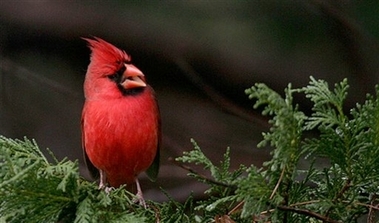
Breaks Leg Skiing
Arnold $chwarzenegger
California Gov. Arnold $chwarzenegger broke his leg while skiing with his family Saturday morning in Sun Valley, Idaho, a spokesman said.
$chwarzenegger, 59, was taken to a hospital for X-rays and was discharged with a fracture to his right femur, said Adam Mendelsohn, the governor's Deputy Chief of Staff for Communications.
He will have surgery to repair the bone when he returns to Los Angeles, Mendelsohn said. The governor remained at his Sun Valley home Saturday night and still planned to spend Christmas there.
Arnold $chwarzenegger
Grad Student Debunks Professor's Method
Kate Jones-Smith
Finding a Jackson Pollock painting is the art world's equivalent of a winning lottery ticket.
But proving a Pollock painting's authenticity isn't easy, which is why physicist Richard Taylor's theory that the famed artist's work can be identified using fractals has stirred such interest and controversy.
Now, a graduate student is debunking Taylor's analysis, saying she can make a crude drawing in a matter of minutes that has all the fractal qualities of a Pollock masterpiece.
"I firmly believe his analysis is seriously flawed," said Kate Jones-Smith, a third-year doctoral student in physics at Case Western Reserve University.
Kate Jones-Smith
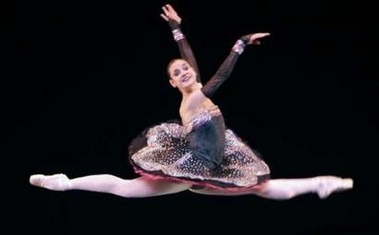
Oldest Stick Sells
Hockey
The world's oldest ice hockey stick, a hickory shaft carved in the 1850s, sold for 1.9 million dollars US (2.2 million Canadian) here and will be displayed at the Hockey Hall of Fame.
An anonymous Canadian man made the winning bid in an internet auction purchase, according to 45-year-old seller Gord Sharpe, an Ontario man who has owned the family heirloom since he was nine.
"The buyer was a private individual, a Canadian, who wants to remain anonymous. He told us that he plans to have the stick over at Hockey Hall of Fame and to keep it there until he decides what he's going to do," David Romeo, chief executive of selling agency Auction Wire said.
Hockey
In Tibet's Interest
Dalai Lama
It was in the interest of Tibetans to be a part of China as the Asian country was an economic giant, Tibetan spiritual leader, the Dalai Lama, said on Sunday.
"It is in our own interest to remain with People's Republic of China. A powerful nation -- economically very powerful," he told an audience at a book launch in the Indian capital.
"So, therefore, being with the People's Republic of China is our own interest provided they give us meaningful autonomy," the Nobel peace prize winner, who lives in exile in the Himalayas in northern India with his followers, said.
Dalai Lama

Artist Ready To Paint France's Mont Blanc Red
Marco Evaristti
For the "bad boy" of Danish art, his plan to colour red France's Alpine summit of Mont Blanc -- the highest peak mountain in western Europe -- is not a gimmick but an elaborate statement to raise awareness of environmental pollution.
Marco Evaristti, originally from Chile, prefers to keep the details of this scheme to tint the snow on one of Europe's highest peaks to himself "as the French authorities would stop me, labelling the idea insane," he said.
The artist -- with an affinity for going against the grain -- is determined to carry out his ambitious mountain project "without permission."
Marco Evaristti

Invade Colorado Town
Tumbleweeds
The blizzard that dumped up to 4 feet of snow in Colorado's mountains brought a different force of nature to this Front Range town: tumbleweeds that piled up to 20 feet high.
"I couldn't see out the kitchen window, and it's on the second story," said Lisa Jackson, a resident who lives near the Pueblo West golf course. She and her husband were still trying to dig out from the tightly packed weeds Friday.
On Friday, residents were helped by crews from the Pueblo West Metropolitan District, a group of Pueblo West volunteer firefighters, and a "chain-gang" of inmates from the Pueblo County jail.
Tumbleweeds
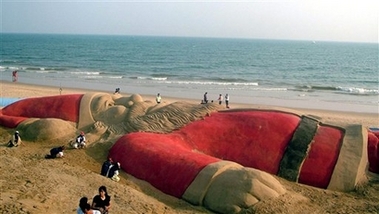
Royal Murder Mystery Solved
Spain
For more than 600 years, Spaniards have believed Prince Sancho de Castile's uncle poisoned him to become king of Spain, but studies of the boy's mummified body show the seven-year-old died of natural causes.
One of Spain's great royal legends may have been put to rest by medical tests that show Sancho, son of King Pedro I "the Cruel" of Castile, and a successor to the throne, was likely to have died in 1370 of a lung infection such as pneumonia.
Examinations of the prince's body have found no trace of cyanide, arsenic, mercury or any other poison his uncle, Enrique, was believed to have used to kill him, according to the convent where the prince's remains have lain since 1409.
Enrique, the illegitimate son of Alfonso XI of Castile, killed his half brother Pedro I in the Castilian civil war in 1369 and became King Enrique I "the Bastard" of Castile.
Spain
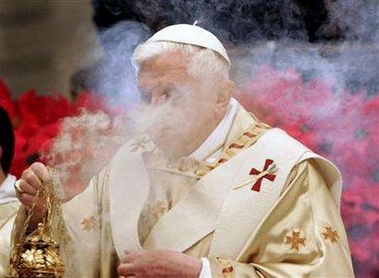
Copy Of Poem Sold
'A Visit from St. Nicholas'
A businessman paid $280,000 for an original 1860 handwritten copy of the classic poem that begins "'Twas the night before Christmas" and read it to friends at a party, an auction gallery said Tuesday.
The buyer, identified only as the chief executive officer of a media company, received the copy of the poem this month, just in time to read it to relatives and business associates at a holiday party in his Manhattan apartment, Heritage Auction Galleries president Greg Rohan said.
Clement Clarke Moore wrote the poem, "A Visit from St. Nicholas," in 1822. He wrote and signed the 1860 copy for an acquaintance. Three other copies in his writing are known to exist, but those are in museum collections, Rohan said.
'A Visit from St. Nicholas'

| CURRENT MOON lunar phases |
